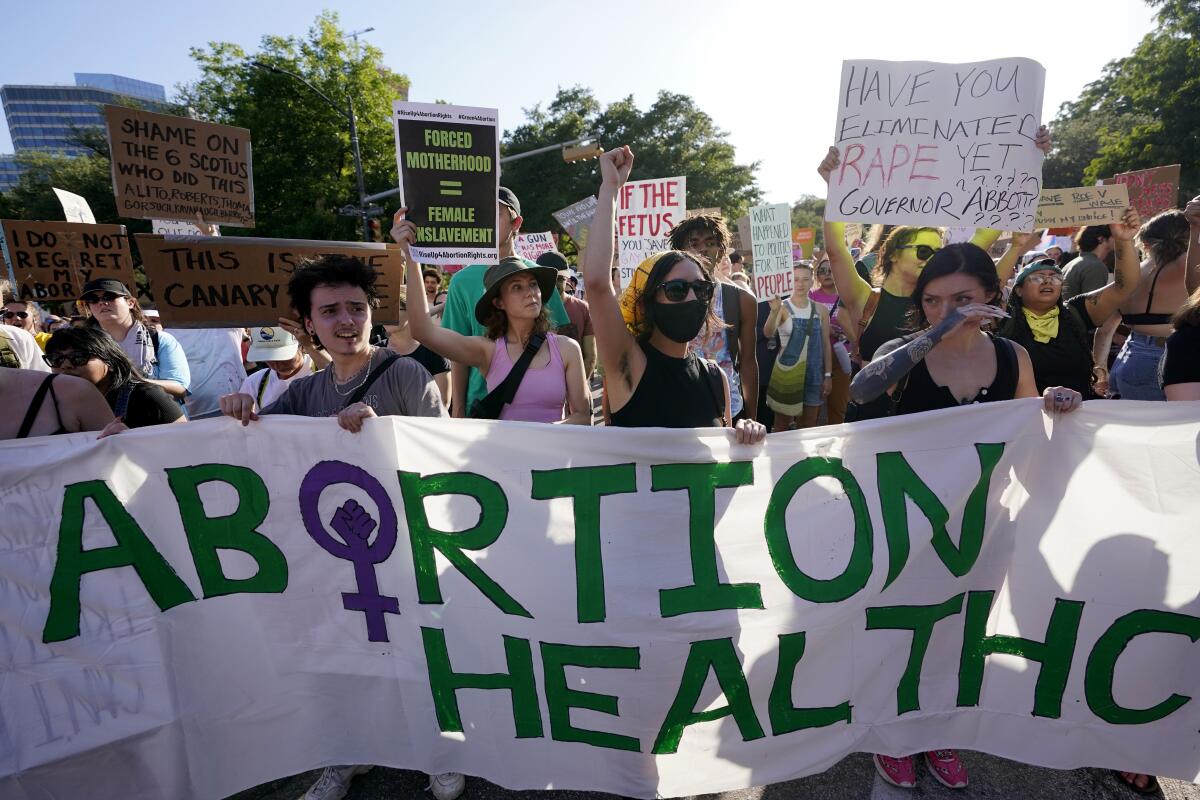Editorial: In Kansas and other states, voters have the power to defend the right to an abortion

- Share via
In the month since the Supreme Court took away the constitutional right to an abortion and left it up to states to decide, advocates have pushed in every direction to win back the bodily autonomy women deserve.
They have sued to block state abortion bans from going into effect (with some temporary success), argued for President Biden to declare a public health emergency to allow access to abortion medication (he hasn’t done it yet) and pushed Congress to pass a law codifying a national right to abortion. (Although it has passed the House, there is little hope that it will get the necessary 60 votes in the Senate.)
But there is another way to secure a right to abortion that doesn’t involve a court, the president or a state legislature. In about half a dozen states, voters will consider ballot measures on abortion — the largest number of abortion-related measures on record in one election year.
California lawmakers consider a dozen bills that will help prepare the state to be a haven for people seeking abortions.
All but one are measures to amend a state constitution to either include a right to abortion or exclude it. In California and Vermont, states that already protect access to abortion, the ballot measures would explicitly enshrine a right to abortion in the state constitution. While abortion rights aren’t endangered in either state currently, an explicit right to abortion in their state constitutions guarantees access to the procedure and ensures it’s not easily overturned by future lawmakers.
The stakes are higher in Michigan, Kansas and Kentucky, where abortion rights supporters face legislatures that are expected to ban abortion.
With these state ballot measures, voters will have a direct voice on the future of access to abortion, whether it is currently legal or not. In states where polls show the majority of residents support at least some abortion rights but their state legislatures are likely to ban abortion, this is the best opportunity for voters to thwart lawmakers’ political agendas.
A declaration of emergency would allow the use of medication abortion pills everywhere, even in states where abortion is banned.
There are signs that voters and supporters are energized already. In Michigan a citizen-initiated campaign to amend the constitution to guarantee a right to abortion submitted for certification more than 750,000 signatures — a record number for a ballot measure campaign in that state. A decision on whether the measure qualifies for the November ballot is expected by the end of August.
In Kansas and Kentucky, the state legislatures have put measures on the ballot that would amend their constitutions to state explicitly that there is no right to abortion.
The Kansas vote will take place on Tuesday. For now, abortion in Kansas is legal up to 22 weeks of pregnancy, but with numerous restrictions, such as waiting periods and mandatory counseling. A 2019 state Supreme Court decision found that the Kansas Bill of Rights protects every person’s right to personal autonomy, including a woman’s right to decide whether to continue a pregnancy. The ballot measure would amend the Bill of Rights to remove the right to an abortion and allow state lawmakers to pass laws that prohibit abortion in most circumstances.
Abortion rights advocates say the wording is deliberately confusing: “Yes” means you want to have no right to abortion in the constitution and “no” means you want to keep the constitution as currently written, which has been interpreted as having a right to abortion. Furthermore, the language is broad. While state legislators say the change will allow commonsense regulations on abortion in Kansas (it’s already substantially regulated), advocates believe the Republican Legislature will pass an abortion ban.
The timing of the election couldn’t be worse for abortion rights advocates. The Republican Legislature paired the ballot measure election with the state primary. But 30% of Kansas voters are not affiliated with a party and don’t typically cast ballots in primary elections. Even Democrats sometimes sit out the primary when there is no contested race. Abortion rights advocates have had to publicize that this is an election that everyone can and should vote in, whether they have a party affiliation or not.
In Kentucky, a trigger ban prohibiting all abortions except to save the pregnant person from death or permanent injury has been temporarily blocked by a state judge who ruled it probably violates rights to privacy and self-determination protected by the state constitution. Early last year the Kentucky General Assembly voted to put an amendment on the ballot this November that states that nothing in the Kentucky Constitution protects a right to abortion. If that passes, Kentucky residents face the prospect of that sweeping trigger ban on abortion being allowed to take effect.
In Montana, the ballot measure isn’t a constitutional amendment but a proposed law that would require medical treatment for infants born alive after induced labor, caesarean section or attempted abortion. This is a measure worded in a highly charged way to talk about something that is rare and already regulated by a 2002 federal law about infants born alive after an attempt at induced abortion.
This measure requires medical attention, which is already mandated, but the Montana Medical Assn. has opposed the policy because it would dictate specific medical treatments and impose penalties on doctors. The measure would also establish a $50,000 fine and/or 20 years in prison as the maximum penalty for violating the law. None of this is warranted. And this measure shouldn’t pass.
Poll after poll shows that Americans support the right to abortion and disagree with the Supreme Court’s decision to abolish the guaranteed right to abortion under Roe vs. Wade. These ballot measures give voters the chance to send a clear message to lawmakers that they want the right to abortion protected, not ripped away from them.
Every state that has an abortion measure on the ballot needs people to show up and register their opinion. Everyone should be on the record on this. If you support abortion rights, the polling place is one forum where you absolutely will be heard and one place you will make a difference.
“The Supreme Court has said we are sending this back to the states,” says Sharon Brett, legal director of the ACLU of Kansas. “Let’s show them what we’ve got. The people don’t want a total abortion ban.”
More to Read
A cure for the common opinion
Get thought-provoking perspectives with our weekly newsletter.
You may occasionally receive promotional content from the Los Angeles Times.













